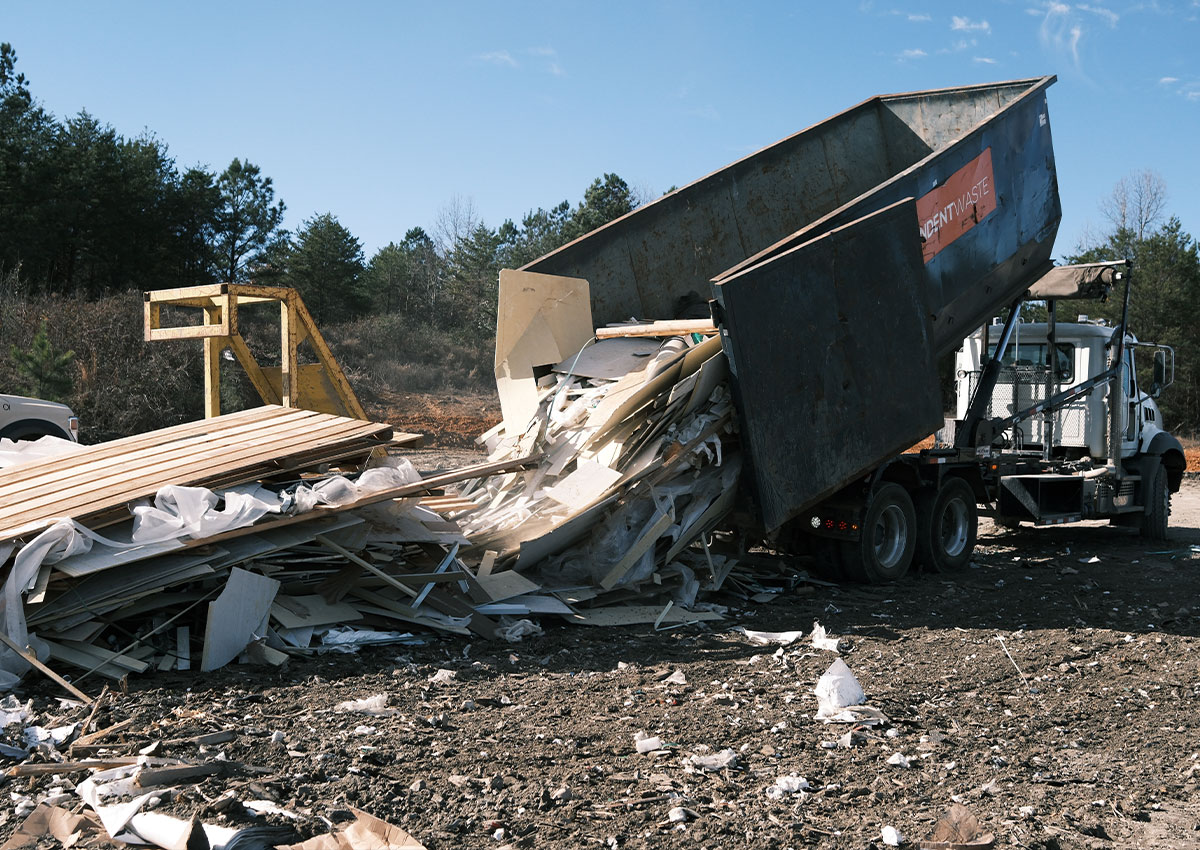List of Unacceptable Materials
Don’t toss aerosol cans in roll-off dumpsters: their residue, flammability, and fragility pose explosion, fire, and contamination risks. Puncture and empty them safely and recycle them through designated local programs.
Decomposing bodies attract pests and release harmful bacteria, potentially contaminating the dumpster and surrounding area, while also posing risks to sanitation workers. Always consult your local regulatory agencies or contact your local landfill directly for proper carcass disposal procedures.
Freon-filled appliances like fridges and AC units are no-gos in roll-off dumpsters for two key reasons. First, Freon is a potent greenhouse gas, and if it leaks, it becomes an environmental hazard. Second, trapped Freon under pressure can explode if the appliance gets crushed or punctured in the dumpster, potentially injuring workers.
If disturbed even slightly, asbestos fibers can become airborne and cause deadly lung diseases like mesothelioma. Strict containment and handling protocols are required to avoid releasing these dangerous fibers into the environment and harming people.
Concealed contents may be hazardous or explosive, posing risks to waste workers and handlers. Additionally, hidden leaks or damage in sealed barrels could lead to the release of harmful substances. Improperly disposing of these containers in dumpsters may violate state and federal regulations, risking environmental and health hazards.
Chemical leaks can pollute landfills and surrounding soil, harming ecosystems and potentially entering groundwater. Additionally, flammable, corrosive, or reactive chemicals pose explosion, fire, and health risks to waste workers and the environment. Opt for safer disposal options like hazardous waste centers or dedicated chemical recycling programs.
Electronics contain harmful metals and chemicals that can leach into landfills, poisoning the environment. Damaged electronics can spark fires or explosions in the dumpster, endangering workers and nearby areas.
Contaminated soils harbor pollutants that can leak into the ground, polluting soil and water sources and harming ecosystems. Workers handling dumpsters with contaminated soil risk exposure to these toxins and hazardous substances, endangering their health and safety.
Fluorescent tubes contain small amounts of mercury, a potent neurotoxin that contaminates soil and water. Their fragile nature increases the chance of them shattering in the dumpster, releasing mercury vapor and glass shards. Recycle or dispose of fluorescent tubes responsibly through designated programs or certified facilities equipped to handle and process them safely.
Medical waste, like needles and syringes, carries potential pathogens and infectious agents that can pose serious health risks to workers handling the dumpster and anyone in the vicinity if it accidentally punctures or leaks. Improper disposal of medical waste also violates several safety regulations and patient privacy laws (HIPAA).
Always use designated medical waste disposal channels through specialized waste management companies to ensure safe and compliant disposal.
Used oil contains harmful chemicals like heavy metals and hydrocarbons. Even seemingly drained filters can retain traces of oil, presenting a fire risk if they come into contact with sparks or heat in the dumpster. To protect soil, groundwater, and worker safety, these items are prohibited.
Propane tanks are prohibited in roll-off dumpsters due to the explosive risk. Residual gas or sparks can trigger blasts, endangering workers and the surrounding area. Always opt for safe disposal through propane retailers or designated recycling facilities.
Radioactive materials require specialized handling, storage, and disposal methods to prevent contamination and ensure the safety of waste workers and the public. Standard dumpsters are not equipped to meet the stringent safety measures and regulatory requirements associated with radioactive waste.
Railroad ties are treated with harmful chemicals like creosote and arsenic, making them environmental hazards. Tossing them in a roll-off dumpster risks soil and water contamination, endangering ecosystems and potentially harming people.
Tires are deemed hazardous because they’re composed of rubber, which does not decompose effectively over time, resulting in degradation problems in landfills. As tires deteriorate, they trap methane gas and become buoyant, which can disrupt landfill design and become a fire hazard.
Any materials deemed explosive, toxic, biohazardous, corrosive, or otherwise hazardous to human or environmental health are not permitted in our containers.

List of Generally Acceptable Materials
What Makes Us the Most Trusted Construction Waste Haulers
Questions About Your Waste Materials? Ask Our Experts
We understand that some situations require speaking to an expert. If you’re unsure about a waste type on your job site, reach out to our team today for personalized recommendations. We’ll let you know if a roll-off dumpster is right for you and find the ideal size.